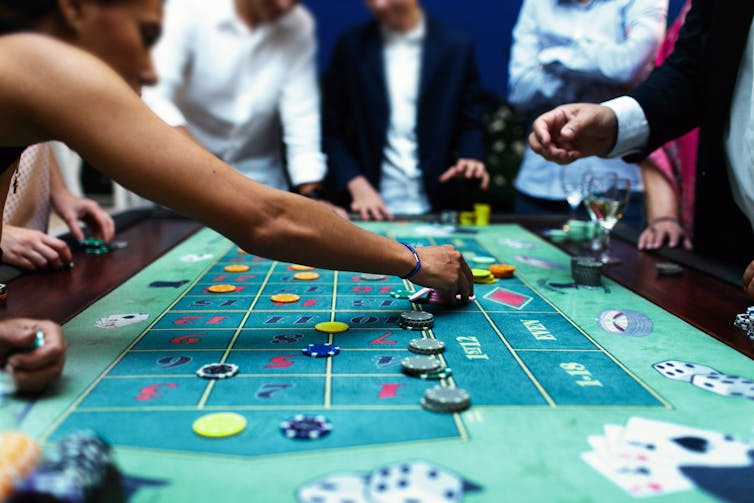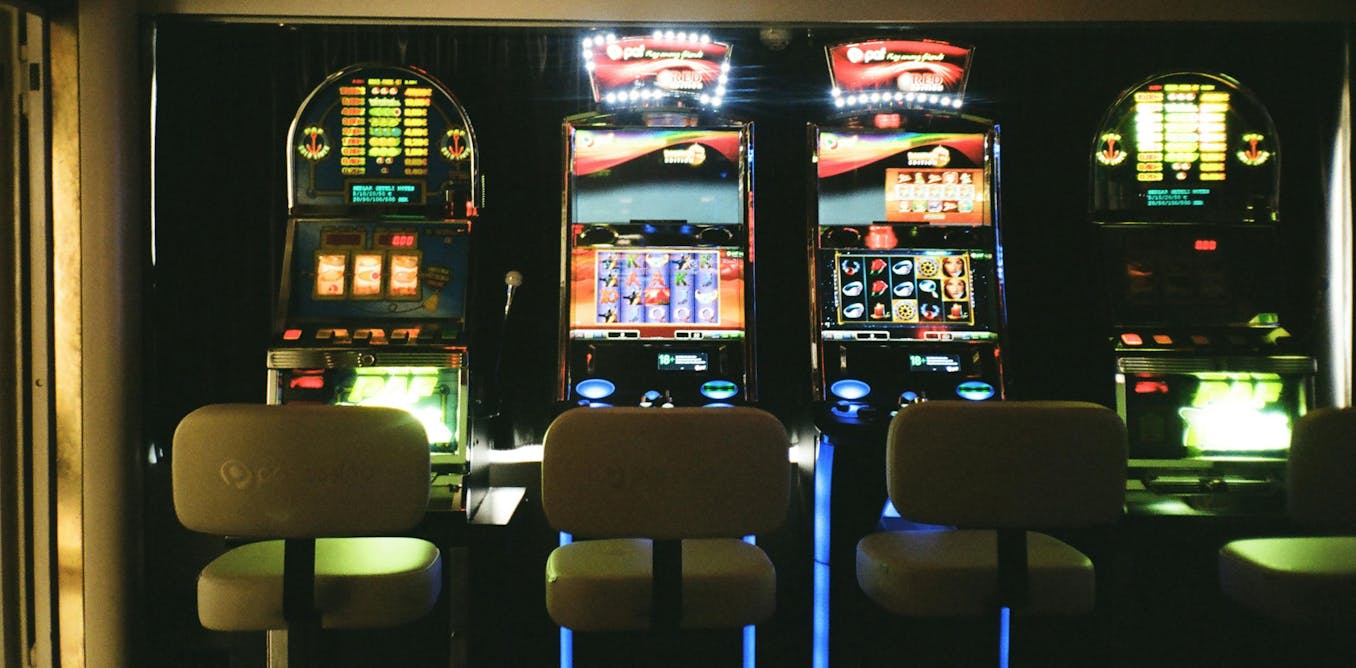Whether you’re watching TV, attending a footy game, or eating a meal at your local pub, gambling is hard to escape. Although the rise of gambling is not unique to Australia, it has become normalised as a part of Australian culture.
While for some, gambling might be a source of entertainment, for others, it can lead to significant harms.
Gambling and mental illness
Research consistently shows gambling problems often occur alongside other common mental illnesses and substance use disorders. We see particularly strong links between gambling disorder and nicotine dependence, alcohol use disorders, mood disorders such as depression, and anxiety.
In many cases, harms associated with gambling lead to poor mental health. But people experiencing mental illness are also at greater risk of experiencing gambling problems.
Gambling harms exist on a spectrum. For some time, there’s been a focus on those people who develop a gambling disorder, where they have recurring problems with gambling, leading to clinically significant distress and impairment in their daily life.
But we must also look at those who are on a different part of the spectrum, yet still experiencing gambling-related harms.
A person might not have a diagnosable gambling disorder, however they still may face problems in their life as a result of gambling. These can include problems in their relationships, financial debts, and negative effects on work or study. All these things can contribute to poor mental health.
Read more:
We’re told to ‘gamble responsibly’. But what does that actually mean?
Gambling and suicide
Feelings such as stress and isolation, possibly compounded by mental illness, may cause some people with gambling problems to feel like there’s no way out.
Research from different countries has shown that among people receiving treatment for problem gambling, between 22% and 81% have thought about suicide, and 7% to 30% have made an attempt.
Some 44% of Australian veterans experiencing gambling problems have thought about suicide, while almost 20% have made a suicide plan or attempt.
Marjan Apostolovic/Shutterstock
A recent Victorian investigation into gambling-related suicides assessed records from the Coroners Court of Victoria between 2009 and 2016. The researchers found gambling-related suicides comprised at least 4% of all suicides in Victoria over this period, or around 200 suicides.
Gambling-related suicides were more likely to affect males (83%) compared to total suicide deaths in Victoria over the same period (75%). They were significantly more likely to occur among those who were most disadvantaged.
The researchers note these statistics underestimate the true number of gambling-related suicides. This is because, unlike for drugs and alcohol, at present there’s no systematic way gambling is captured as a contributing factor in suicide deaths.
When we also take into account the number of people who may have considered suicide, or survived a gambling-related suicide attempt, we can see the problem is likely to be significantly bigger than these statistics indicate.
Gambling is inherently risky
Electronic gaming machines, more commonly known in Australia as “pokies”, are the product most strongly associated with harmful gambling. Evidence shows pokies alone are responsible for more than half of all gambling problems in Australia.
Casino table games are equally risky, but in the general population they contribute much less to problem gambling because fewer people play them.
While gambling itself comes with a degree of risk, individual vulnerabilities can place certain people at even greater risk of harm. As well as people with mental illness, men are at higher risk of gambling problems than women. People who are single or divorced are at higher risk compared to people who are married. People with higher levels of income and education are at lower risk.
What can we do?
Angela Rintoul, the lead author of the Victorian research mentioned above, this week published an article in the Medical Journal of Australia in which she argued gambling-related suicides are preventable.
She suggested health professionals could make it part of their routine practice to ask simple questions like “in the past 12 months, have you ever felt that you had a problem with gambling?”. Or, “has anyone commented that you might have a problem with gambling?”.
Rintoul also discussed strategies governments could adopt, such as a complete ban on gambling advertising, and a universal account registration system to allow people to set limits on their gambling losses.

IVASHstudio/Shutterstock
To reduce gambling-related suicides, we need to see policy change. In June 2023, a cross-party committee presented a report with 31 recommendations to reduce harms from online gambling in Australia.
One of these recommendations was a comprehensive ban on online gambling advertising. But the government is yet to respond to the report.
Advice for people who gamble
For people who do choose to gamble, it’s important to be aware of the risks. Understand how gambling and poker machines really work, and that they’re there to make money for venue owners, not to provide wins for players.
If you choose to gamble, set limits on the amount of money you’re willing to loose, or the amount of time you will spend gambling. The Lower Risk Gambling Guidelines for Australians suggest following these three recommendations:
-
gamble no more than 2% of your take-home pay
-
gamble no more than once a week
-
take part in no more than two different types of gambling.
If you notice you’re thinking about gambling more and more, or that it’s causing problems in any part of your life, seeking help early is key. Speak to your GP about how you can get some extra support, or visit Gambling Help Online.
If this article has raised issues for you, or if you’re concerned about someone you know, call Lifeline on 13 11 14.

